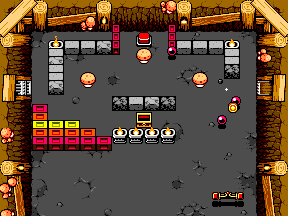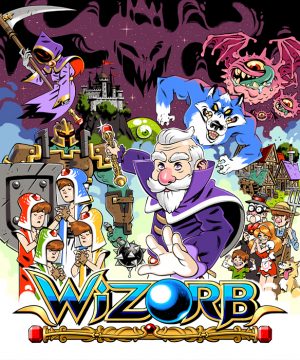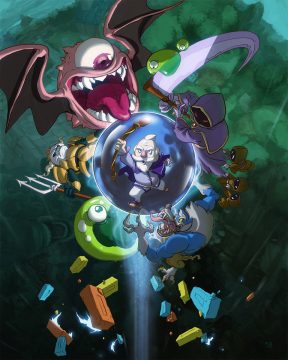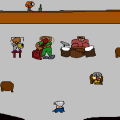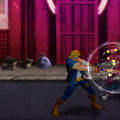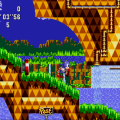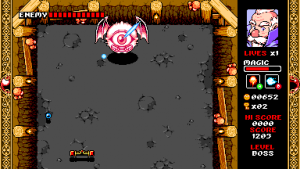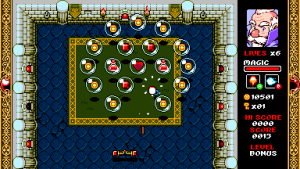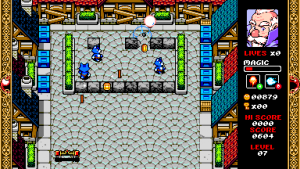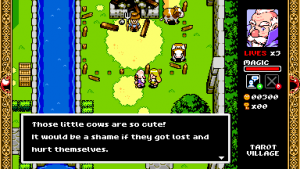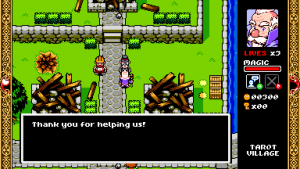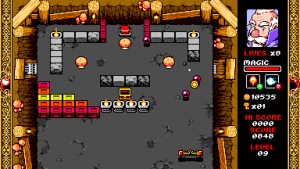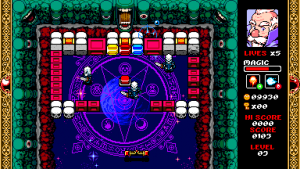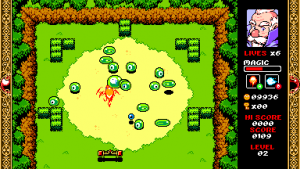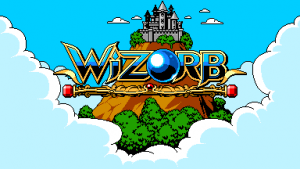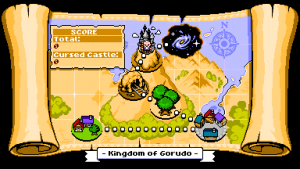Despite being one of the recognizable genres in gaming history, you don’t often see many brick-breaking games in the style of Breakout nowadays. Not counting the anemic ports/remakes, the last proper Arkanoid game was released in 1997, and the genre hasn’t really evolved much since then. Tribute Games’ Wizorb, released on the XBLIG and on the PC, takes the formula of Taito’s classic, updates it to a fantasy theme, changes some of the mechanics, and wraps it in the trappings of a retro role playing game, providing a significantly more creative take on the genre than the usual shareware/casual game cash-ins.
The fundamentals are familiar – you control a stick at the bottom of the screen, which is actually a wizard named Cyrus who can morph into a wand. You must destroy all blocks and enemies on the screen using a bouncing ball to to proceed, and dropping a ball will lose a life. The major adjustment comes with the addition of magic spells. You can shoot fireballs (a la the laser in Arkanoid), use wind to control the direction of the ball while it’s in the air, super charge it so it’ll crash through multiple bricks without bouncing back, or give the ball wings so you can control it. It allows for a bit more strategy than just reacting to where the ball’s going. Unfortunately, your magic meter isn’t very big, and replenishments don’t fill much of the gauge, so in practical terms you don’t end up using it a whole lot. Still, there are extra niceties that make things a little bit easier – namely, if you hit the ball eight times without it making contact with a block or an enemy, you’ll get a small magic charge, useful for getting that close block to that seems to take forever to hit. Upon losing the ball, you not only get to chose your angle but also where on the screen to drop it, again making it easier to hit trouble spots without going mad. It controls nicely with the analog stick on the Xbox 360 pad, but the mouse on the PC version is the closest you can get to a paddle controller, making it the superior version.
Wizorb also has a very welcome RPG bent. Many blocks drops gold coins and gems, and your performance also earns you extra bits of gold. There’s a lot more stuff falling from busted bricks than other games, giving an extra challenge to grab everything and keep the ball in play. Certain blocks also send enemies at your wand, which can gum up your movement, drain your magic, flat out kill you, or cause other maladies. There are also classic Zelda-style shops on many screens, where you can purchase magic replenishments, extra lives, keys (to unlock other shops and bonus areas in certain levels), magnets to let you catch the ball, trigger multi-ball, increase the power of the ball, extend your wand, and other useful power-ups. Between areas you can also visit the local village, which has been destroyed by a great evil. You walk around this area in human form, and can bestow your extra cash to help revisit the village. Sometimes you’re given extra items, although not every person you help will rebuild something useful. Most your generosity is rewarded with the fact that you’ve satisfaction in helping out digital people without any payback, which is nicely benevolent.
The visuals are very similar to Scott Pilgrim vs. the World (which the developers also worked on) in that the style is very similar to 8-bit NES games but working without the technical limitations – the limited color palette and tile usage – giving it a pleasantly post-retro style. The coloring is bright and gorgeous, and it’s all very well animated and detailed. Most amusing is the wizard himself, who looks like a drunken version of Santa Claus, who laughes when you beat a stage or winces when you lose a ball. Keeping with that style, the music is all 8-bit style chiptune based, although they aren’t any tracks that match the high quality of the graphics. They also fail to stand up to repeated listens, and you’ll be hearing them a lot – there are five worlds with twelve levels each, and there’s only one song for each world. There are over sixty levels total, in addition to boss fights, making it quite lengthy. Although the game does auto-save your level, if you run out of continues, you need to start the whole world over, which is quite a trek. Still, continues are generous, and as are extra lives.
Wizorb doesn’t reinvent the brick-breaking genre in the same way that Sidhe’s Shatter did in 2009, but it is the best Arkanoid game that’s not actually Arkanoid.
Links:
Wizorb The official site.
